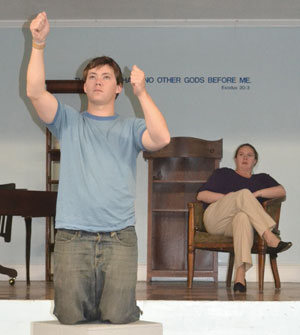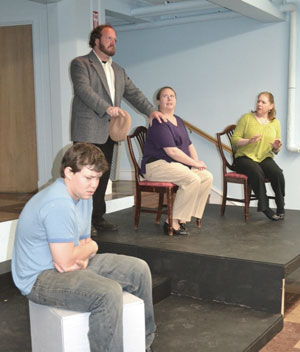
Equus runs June 10-18 at The Unity, 6 William Street, Somerville.
By Sanjeev Selvarajah
Somerville Theatre@First’s treatment of Peter Shaffer’s play Equus avoids many of the dramatic techniques contained in the script, but everything else, from plot to dialogue, is representative of its core themes of isolation and passion.
The moral seems to overlap with the French animosity towards ocularcentrism— a 70’s artistic movement that rejected obsession with visual culture. While religious iconography, television, and the literal eyesight of beasts and men feature prominently in the English play, this production is more pragmatic and relatable to modern audiences.
Alan Strang, played by Adam Schofield-Bodt, is a disturbed young man who blinded six horses, and has a difficult relationship with his parents, Dora and Frank.
Elizabeth Hunter plays Dr. Dysart, the psychologist who treats Alan, in a role that traditionally has gone to male actors. “Having a female Dysart is fascinating. On the surface, it changes very little—we didn’t have to adapt the script much at all. But underneath that, it changes everything. As a woman, with the cultural imperatives for nurturing and the greater emphasis placed on relationships, Dysart’s own relationship failures become more central to the character,” said Hunter.
Dysart walks a fine line between the dialectic of psychotherapy and the steady increase of sympathy she feels for the sensitive and troubled teenager. “There is something maternal about her relationship to Alan,” says Director David Policar. “Originally, Dysart as a male role model took the place of Frank the father, but now Mrs. Hunter’s character is replacing the mother, Dora, in Alan’s life—offering doses of rehabilitation instead of religion, the latter which Dora espoused. Oddly enough, considering Frank as an antithesis to Dora, Elizabeth may in fact be a substitute for both.”
Policar regards another significant theme to be passion. The horses that the teenage boy is fixated upon are beasts of burden and his worship for them provides a clash of interests and passion.
When asked if one pivotal scene where the two main characters exchange heated words on sensitive matters remains intact, in spite of Dysart’s gender, Policar stated, “It absolutely is there. I have not removed any scenes, and I certainly could not remove that one without doing damage to the play. Alan turning the tables on Dysart leads organically into the realization that passion is as much of an issue for Dysart as it is for Alan, albeit in a different way; that realization is key.”
Alan cannot help but acknowledge Dysart as an authority figure. She plays both a caring and disciplinary force in his life, as a parent would.
Equus runs June 10-18 at The Unity, 6 William Street, Somerville. Show times and ticketing information can be found at www.theatreatfirst.org.
















Reader Comments